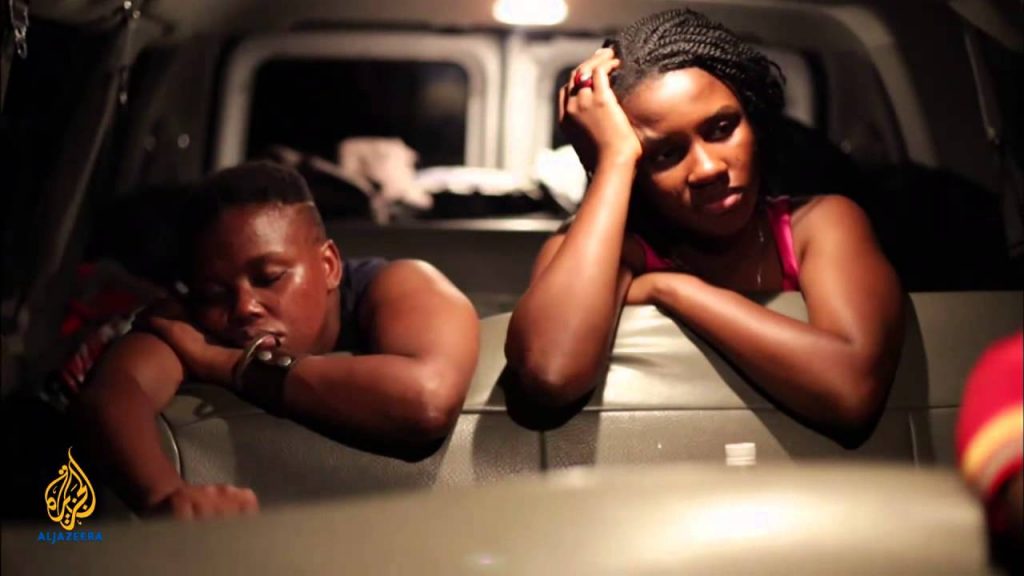What is the new image of Africa?
“Africa is finally seizing control of its image” goes the mantra. But which Africa and which image?

Image by Barbara Minishi.
Al Jazeera continues its journey on the “Africa Rising” trail, this time with a documentary series on cultural elites—young photographers from Kenya, Mozambique, Nigeria, the Republic of Congo, and South Africa (see our review on the previous series on African business men here). “Africa is finally seizing control of its image”—this is the motto of the documentary series. After having served as a colonial tool and having reduced Africa to a singular image (that of starving kids), Al Jazeera seeks to demonstrate that the new African photography finally presents and represents an optimistic image of “a continent on the rise.” But which Africa emerges from the photographers’ work, and which image is created?
The individual films trace each photographer’s current project, reflect with the artists on their philosophy, and depict the challenges that they face with their work. While all of the six films are well made, the overall Al Jazeera theme—suggesting passive depictions of economic boom in selected countries—distracts from the actual social problems that the photographers tackle in their work and the challenge of representation. There is the theme of bridging the gap between rich and poor, strengthening a fragile national identity, and of dreaming of a better future. The artists’ work demonstrates that no singular (optimistic) image of African countries, societies, and people can be created—and that even the image the photographers have in mind and that they so carefully prepare often escapes them.
Take Mario Macilau for example, from Mozambique, who believes in photography “to change people’s minds”—but “not like an NGO—there is a goal to develop this or that; for me photography is something very strong to communicate with someone.” As a consequence, as a photographer, he tries to understand his subjects at a dumpsite on the outskirts of the capital Maputo not as people who are suffering, but “as human beings.” Macilau’s goal is to give these people a voice and demonstrate injustice. However, this goal escapes him in the course of his work, as he has already given up on Mozambique, and thus on social change: “For me, Mozambique is lost, it’s my country, but it’s lost, there’s no social development, there’s no middle class in Mozambique.”
Or Barbara Minishi, Kenya’s first female fashion photographer. She photographed fifty women in the same red dress that embodies “Wanjiku,” Kenya’s new constitution and the common Kenyan woman. She wants to use the dress as a tool to hear different women’s stories and explore who “the Kenyan woman” is. However, what she designates as the national dress—a red dress with a Kenyan flag—is not how every Kenyan woman imagines it. For example, the photographer goes on the campaign trail with the only female candidate for presidential elections, Martha Karua, in March 2013 to take her picture in the dress. The only problem: the dress is red, and that’s the color of the competing party, so the candidate doesn’t want to be associated with it. When Barbara Minishi nevertheless gets an opportunity to take the photo with Karua in the dress, the candidate shouts out: “this looks like an English dress!”
Baudouin Mouanda, who became famous with his series on Brazzaville’s Sapeurs, pursues a similar idea as Barbara Minishi—he photographs women in the same white wedding gown in crowded train cars and dumpsites in Congo, and on the streets of Dresden, Germany. Here it’s not the dream of national unity that the dress represents, but that of beauty and individual possibilities in whatever contexts women find themselves. He imagines that every woman’s dream is to be happily married in a white dress. But does marriage still represent that dream, that beauty? His models discuss what they are preparing themselves for—their husbands coming home late without explanation. And even Baudouin considers marrying late, since a divorce would be much less likely at that point.
What the films show in a thought-provoking way are the contradictions that necessarily accompany the themes of inequality, national unity, and personal dreams and the difficulty to represent and not avoid these contradictions. In contrast to the Al Jazeera framing, the actual documentaries do mostly what they should do—they document and don’t provide ready-made responses to what the new image of Africa is or what it should be.
- You can watch the six documentaries on Al Jazeera’s website here.



















